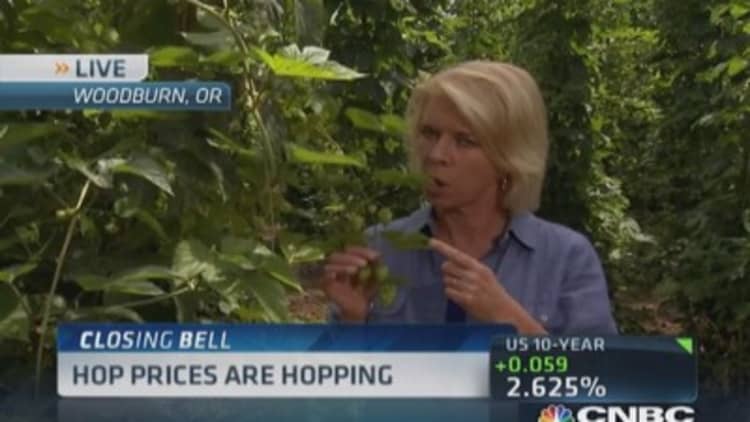There's no beer without hops, and with prices for the critical ingredient rising, craft brewers are paying attention.
Hops need to be planted at least one to two years ahead of actually making their way to brewers, because growers need time to plant and cultivate the necessary acreage. Those deals are handled by contract between brewers and growers.
Thomas Marsh, a professor of agricultural economics at Washington State University, told CNBC that contract hops prices have doubled and even tripled since the last USDA National Hop Report—a government study that last took place in 2012.
Surging demand forces small brewers, especially entrepreneurs just entering the booming craft beer business, to the spot market to fulfill some of their needs. But the spot market accounts for only about 10 percent of the total harvest—and those prices are spiking even more than contract prices.
With nearly 400 new brewers entering the craft market in 2013 alone, competition for those spot hops can get fierce.
Read More Hop prices hop: Turns out beer and pot are 'cousins'
"We did establish a contract, but not everything we wanted in that contract was available," said Chris Sheehan, brewer for Gun Hill Brewery, which opened in Bronx, N.Y., this year. "It wasn't as bad as the crisis in 2008, when the prices on the hops was punishing, but it was a little bit more than what the contracts were for."
The hop industry is aware of the pain some brewers are feeling, but that may not help new entrants in the market.
Read MoreState of hoppiness: How many IBUs in your IPA?
"It's kind of a chicken-and-egg-type thing. You can't order hops because you don't have a business going, but you can't start the business without the hops," said Drew Gaskell, brand manager for Select Botanicals, a hop breeding company.
Spot volatility
Brewers typically tell contractors like Hopunion LLC, a grower-owned co-operative, their needs for the next two to five years, and the contractor's growers then can plant to meet those needs, said Melody Meyer, marketing director of Hopunion.
"We focus not on those peaks and valleys but instead focus on our growers to make sure they can expand and sustain demand," she said. "It allows for a sustainable pricing model."

Certain varieties are more in demand than others, and with breweries opening left and right with the craft boom, there's a perfect storm for spot volatility.
"You're going to see volatility specifically in the spot market," said Washington State's Marsh. "But because contract markets are turning over every three years you could see volatility there, too. That volatility you may not see as much, but you could still see it."
Read MoreTobacco, tar heels and tulip glasses—NC's craft beer boom
Contract hops are favored by both brewers and growers because they reduce volatility in a market that historically has fluctuated a great deal.
"There won't be much hops, if any, on the spot market. So if there is anything on the spot market, it will be a relatively higher price. Especially with people contracting for growth," said Bryan Bechard, managing director of the Country Malt Group.
The most volatile of these varieties are the hops favored for IPAs: proprietary multi-use varieties such as Citra.
Citra was contracted for $10.33 per pound through the Country Malt Group for 2014, though spot prices for the hop in 2013 could hit up to 168 percent of that cost ($17.35 per pound through Hops Direct) and more before selling out.
"They don't kill you, but those are the ones I'm definitely long on the contracts ... for that specific reason," said Tim Hawn, brewmaster at Dogfish Head Brewery in Milton, Delaware.
Proprietary v. public
With "hoppy" beers popular among craft brews, some companies like Select Botanicals have developed new strains of hops for specific aromatic and bittering qualities. These hops, once developed, become the intellectual property of the company and are grown only by farmers selected by the company.
"We breed these varieties of hops, and we exist to bring money to the growers and the brewers by breeding hops that are quality for brewing," Gaskell said.
Select Botanicals owns the full rights to popular hops like the Simcoe variety, as well as a half-stake in Citra hops.

Not everyone is a fan of the trend toward proprietary hops.
"It's very frustrating to me and our company because we can't get access to all their varieties," said Sean McCree, hops manager for Brewer's Supply Group. "I wish all varieties were open to all growers. I believe that it's an effort to control the market, and that if they control the supply, they can control the pricing."
But some growers point out that they're actually growing private varieties in relatively big volumes, and reducing market volatility at the same time.
Read MoreCramer developing taste for imported beer
"I think it's a little bit of mischaracterization to say that private varieties are sending prices higher. You can get into the semantics into what pumps these prices, but in the case of Simcoe we have two dozen growers growing Simcoe now, which is more growers than most public varieties have," said Patrick Smith, the fourth-generation operator and owner of B.T. Loftus Ranches, which grows for Select Botanicals.
"We work really hard to have a consistent and sustainable price to brewers that doesn't have the volatility the hop market has had for generations, going back to my grandfather," Smith said. "Part of the reason why we started this Certified Select program at Select Botanicals was to make sure that we have a stable system between brewers and growers that isn't subject to volatility."
When it comes to concerns that cornering the market on certain varieties may put Select Botanicals in a lucrative spot for pricing, especially considering how selectivity and limited picking windows could constrict supply, Gaskell had the following fact to offer.
"We don't have a market-based approach to our pricing. We have a model based on what it costs to plant the hops, work the picking facilities, and re-invest to grow with demand. We also add a little adjustment per year to keep up with inflation," Gaskell said.
—By Bo McMillan, Special to CNBC.com

